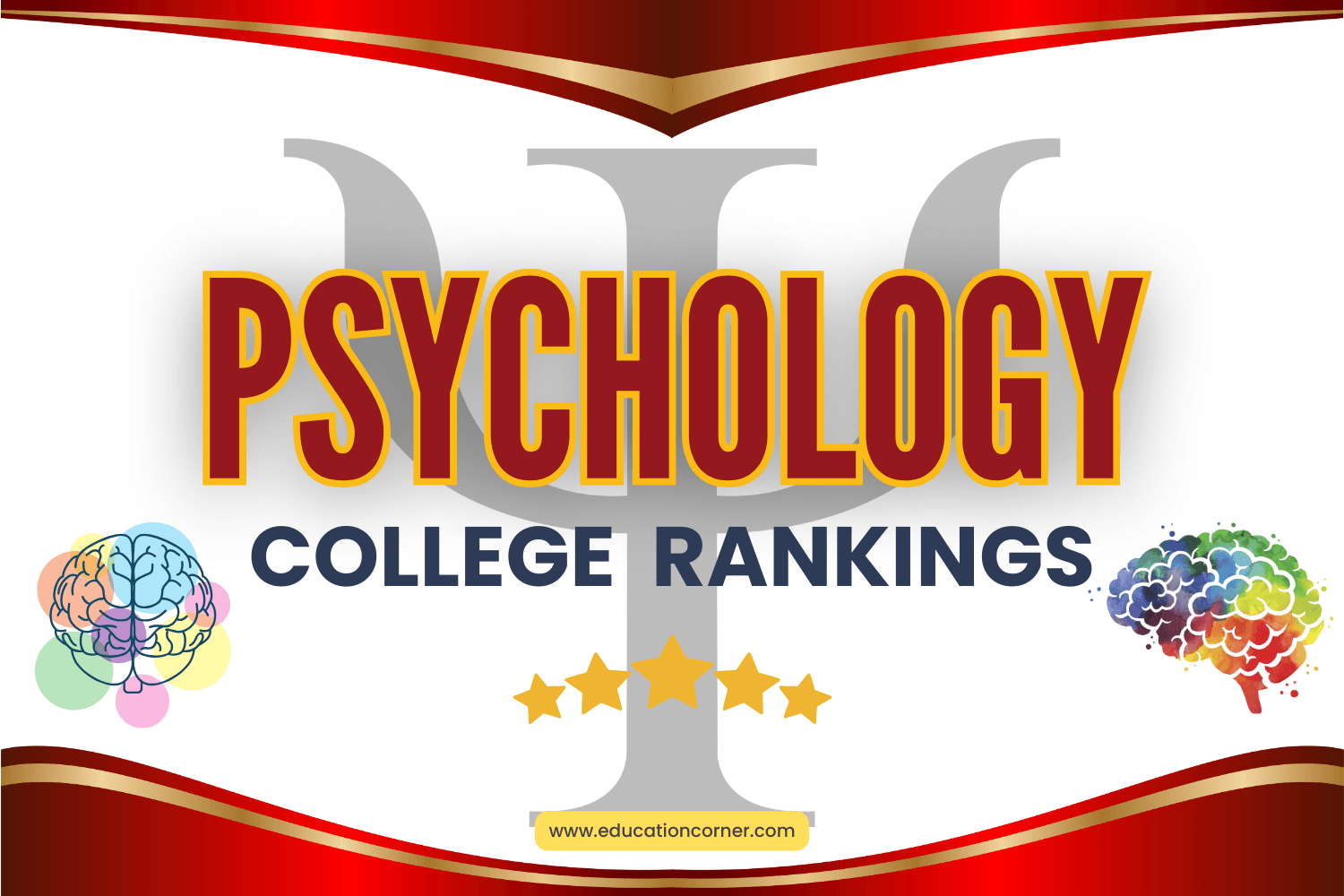
The college rankings below represent the Top 50 graduate-level psychology programs in the United States based on a composite average of the U.S. News & World Report, QS World University Rankings and Gourman Report–as published by the Princeton Review. Any colleges not found on all three indices were excluded.
See also:
Top 100 Colleges and Universities – Top 100 Most Affordable Universities – Top 100 Most Affordable Community Colleges – Top 100 Highest Acceptance – Top 100 Lowest Acceptance – Top Colleges by Major
| Composite Rank | School Name | QS World | US News | Gourman Report | Avg Score* |
|---|---|---|---|---|---|
 | Stanford University Stanford, CA | 2 | 1 | 1 | 1.33 |
 | Harvard University Cambridge, MA | 1 | 4 | 6 | 3.67 |
 | Yale University New Haven, CT | 4 | 6 | 2 | 4 |
 | University of California–Los Angeles Los Angeles, CA | 3 | 2 | 9 | 4.67 |
 | University of California–Berkeley Berkeley, CA | 5 | 3 | 7 | 5 |
 | University of Michigan–Ann Arbor Ann Arbor, MI | 6 | 5 | 4 | 5 |
 | University of Pennsylvania Philadelphia, PA | 9 | 13 | 3 | 8.33 |
 | Princeton University Princeton, NJ | 7 | 7 | 15 | 9.67 |
 | University of Illinois at Urbana-Champaign Champaign, IL | 13 | 8 | 8 | 9.67 |
 | University of Minnesota–Twin Cities Minneapolis, MN | 14 | 10 | 5 | 9.67 |
 | Massachusetts Institute of Technology (MIT) Cambridge, MA | 12 | 9 | n/a | 10.5 |
 | Columbia University New York, NY | 10 | 14 | 14 | 12.67 |
 | University of Wisconsin–Madison Madison, WI | 16 | 11 | 16 | 14.33 |
 | University of Chicago Chicago, IL | 11 | 25 | 10 | 15.33 |
 | University of California–San Diego San Diego, CA | 20 | 17 | 11 | 16 |
 | University of Texas at Austin Austin, TX | 15 | 18 | 19 | 17.33 |
 | Carnegie Mellon University Pittsburgh, PA | 24 | 21 | 12 | 19 |
 | Northwestern University Evanston, IL | 18 | 16 | 25 | 19.67 |
 | Cornell University Ithaca, NY | 25 | 15 | 21 | 20.33 |
 | Indiana University–Bloomington Bloomington, IN | 26 | 27 | 13 | 22 |
 | Duke University Durham, NC | 17 | 22 | 29 | 22.67 |
 | Brown University Providence, RI | 19 | 26 | 23 | 22.67 |
 | Ohio State University Columbus, OH | 19 | 26 | 23 | 22.67 |
 | University of North Carolina–Chapel Hill Chapell Hill, NC | 35 | 12 | 24 | 23.67 |
 | New York University New York, NY | 8 | 30 | 36 | 24.67 |
 | University of Washington Seattle, WA | 38 | 19 | 20 | 25.67 |
 | University of Oregon Eugene, OR | n/a | 35 | 17 | 26 |
 | Johns Hopkins University Baltimore, MD | 27 | 28 | 26 | 27 |
 | University of California–Davis Davis, CA | 30 | 24 | n/a | 27 |
 | University of Virginia Charlottesville, VA | 37 | 29 | 18 | 28 |
 | University of Colorado–Boulder Boulder, CO | 33 | 33 | 22 | 29.33 |
 | Arizona State University Tempe, AZ | 22 | 38 | n/a | 30 |
 | Washington University in St. Louis Saint Louis, MO | 40 | 20 | n/a | 30 |
 | Pennsylvania State University University Park, PA | 29 | 31 | 34 | 31.33 |
 | University of California–Irvine Irvine, CA | 31 | 32 | 38 | 33.67 |
 | Boston University city, state | 23 | 46 | n/a | 34.5 |
 | University of California–Santa Barbara Santa Barbara, CA | 32 | 41 | n/a | 36.5 |
 | Vanderbilt University Nashville, TN | 39 | 37 | 35 | 37 |
 | Michigan State University Michigan State University | 28 | 48 | n/a | 38 |
 | University of Florida Gainesville, FL | 34 | 42 | 40 | 38.67 |
 | University of Illinois–Chicago Chicago, Illinois | 45 | n/a | 33 | 39 |
 | University of Southern California Los Angeles, CA | 36 | 45 | 37 | 39.33 |
 | Purdue University West Lafayette, IN | 43 | 49 | 28 | 40 |
 | University of Iowa Iowa City, IA | 46 | 34 | n/a | 40 |
 | University of Rochester Rochester, NY | 50 | n/a | 30 | 40 |
 | Stony Brook University SUNY Stony Brook, NY | n/a | 50 | 31 | 40.5 |
 | University of Pittsburgh Pittsburgh, PA | 49 | 36 | n/a | 42.5 |
 | Dartmouth College Hanover, NH | 42 | 47 | n/a | 44.5 |
 | University of Kansas Lawrence, KS | 47 | 43 | n/a | 46 |
 | University of Maryland–College Park College Park, MD | 48 | 44 | n/a | 46 |
| *Average score based on average of available college ranking indices. All colleges not found in at least 2 of the 3 indices were excluded from composite rankings. | |||||
The minimum entry-level requirement for any psychology position is typically a bachelor’s or master’s degree in psychology, or in a closely related field of behavioral science. However, more and more positions are requiring candidates to have a Ph.D. or PsyD in psychology. Both the Ph.D. and PsyD are terminal degrees in psychology. This means they are the highests degrees that are awarded. Both degrees are doctorate-level degrees and qualify students to become a licensed, practicing psychologist. If you want to practice psychology in a clinical setting in the United States, earning a doctoral degree in psychology is mandatory.
On average, it takes between 5 and 7 years to complete a doctorate degree in psychology. Upon graduation from either a PhD or PsyD program, students are required to complete a supervised clinical or research-oriented residency under the supervision of licensed psychologist and/or mentor. Most states now require those seeking a career in direct patient care and counseling have a 1 or 2 of experience in a clinical setting before applying for state licensure.
All of the colleges and universities found in the rankings above have been evaluated and ranked based on the quality of their graduate-level doctoral degree programs in psychology. All colleges in our rankings offered accredited PhD and/or PsyD programs in psychology.
PhD in Psychology
The PhD in psychology is a research-oriented degree designed for students interested in pursuing career opportunities in education and research. Upon graduation, students will be prepared for various research and teaching positions at the university level. The PhD in psychology focuses on both theoretical and applied aspects of psychology and the discipline of behavioral science. Earning a Phd in psychology also provides students with a practical education in preparation for a career in counseling and clinical practice. However, those interested in practicing psychology in a clinical, patient-oriented setting typically pursue a PsyD in psychology.
PsyD in Psychology
Unlike the Phd in psychology, which is primarily research-oriented, the PsyD in psychology primarily focuses on the practical application of psychology in a clinical setting where patients are diagnosed and treated. The PsyD was developed to train practitioners, not psychology researchers. Students who successfully complete the PsyD program will be qualified to conduct psychological assessments, diagnose disorders of the mind, administer psychotherapy, and treat a myriad of mental conditions and disorders.
Composite Ranking Methodology for Psychology Schools
The rankings of psychology schools and colleges found in our list of “Top 50 Psychology Programs and College Rankings” offer graduate-level training and education in psychology. The rankings themselves are generated based on a composite average of three of the most reputable college ranking indices for graduate education in psychology. These include the U.S. News & World Report, QS World University Rankings and Gourman Report.
Ranking methodology employed by U.S. News & World Report is based entirely on information taken from peer assessment surveys of the psychology programs at each school. Participants were asked to rank each program based solely on a 5-point scale, with “5” being the highest mark (outstanding) and “1” the lowest (marginal).
QS World University Rankings employs a slightly more robust, and in our opinion, a useful methodology for ranking psychology programs. First, QS rankings are based on data collected from a global survey of employers, academics and research citations. This data is collected to assess academic reputation, employee reputation, and the impact of research conducted.

